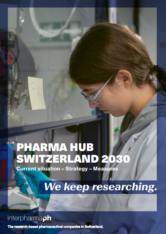In Switzerland, only medicinal products that comply with the legal, internationally harmonised requirements in terms of safety, efficacy and quality are permitted to come onto the market. In Switzerland, Swissmedic, the Swiss Agency for Therapeutic Products, decides on the basis of a thorough review whether a medicine fulfils the legal requirements and can be authorised for sale. This procedure is designed to protect patients from harm and from imitation products.
In order to have a medicinal product authorised by Swissmedic, the applicant must provide extensive documentation, demonstrating to the authority the efficacy, quality and safety of the product in question. The identity, purity and active substance content of the medicinal product must also be documented.
Medicines can then be reimbursed by statutory health insurance providers if the Federal Office of Public Health (FOPH) places them on the List of pharmaceutical specialities (LS). Inclusion in this list depends on fulfilment of the “WZW” criteria, standing for effectiveness, appropriateness and cost-effectiveness. The decision on inclusion is taken by the FOPH at the recommendation of the Federal Medicines Commission (FMC).
The manufacturer or distributor of a medicinal product can request Swissmedic to initiate a fast-track authorisation procedure for a promising product for the treatment of a severe, disabling or life-threatening disease for which no or only unsatisfactory treatment options with authorised medicinal products are available, or if the new medicine is expected to provide a major therapeutic benefit.
If the requested authorisation is denied, the applicant can discontinue the authorisation request, apply for the application to be reconsidered, submit an appeal, or submit a new application.
Delays in the authorisation and reimbursement process
Since 2016, there have been increasing delays in the inclusion of innovative medicines in the compulsory health insurance system. This means that patients are having to wait longer and longer for full and equal access, even though these medicines and therapies have been approved. This negative trend has recently intensified. The statutory deadline of 60 days (KLV Art. 31b) is being exceeded by a factor of several hundred every year and is only being met in rare cases. Moreover, Switzerland is falling further and further behind in terms of access to new innovative medicines: compared to Germany, only about half of the new innovative therapies are fully available in Switzerland. In terms of broad and equal reimbursement via the specialty list, Switzerland is now only just ahead of Bulgaria. This is detrimental to patients, as many of them cannot afford to wait so long.
Dispensing medicines / dispensing categories
Swissmedic decides on the basis of a medicinal product’s benefit-risk profile whether it can be sold and dispensed only on presentation of a doctor’s prescription (prescription-only) or without a prescription (prescription-free). Swissmedic accordingly divides medicinal products into four dispensing categories. Prescription-only medicines are assigned to dispensing category A or B, those available without a prescription to category D or E.
Advice from a specialist is usually required in order to use a medicine correctly. This is why most medicines have to be obtained from specialist sources. Medicines in categories A and B are only available in pharmacies, while those in category D can also be sold in drugstores if specialist advice is provided. In some cantons doctors are also authorised to dispense medicines directly to patients (self-dispensing doctors). The same applies to trained staff in hospitals.
Prescription-free medicines are also referred to as OTC, standing for over-the-counter. These products are intended for self-medication, or in other words for use by the patient on their own responsibility. Medicines in category E can be sold without a prescription and without specialist advice in all retail outlets.
An overview of dispensing categories:
- Dispensing category A: Dispensed once on the basis of a doctor’s prescription.
- Dispensing category B: Dispensed on the basis of a doctor’s prescription. Under certain circumstances, pharmacists are permitted to dispense medicines in category B without a prescription.
- Dispensing category D: Dispensed without a prescription following specialist advice.
- Dispensing category E: Freely available medicinal product (without a prescription/specialist advice).
Important information on the pack
The information on the pack containing the medicine is intended to ensure that a medicinal product can be identified as such with as little room for error as possible. Each pack of medicine must therefore display the required information. This includes the proprietary name of the medicine and the active ingredient it contains as well as other important information about aspects such as safety and correct storage. Every pack also contains a patient information leaflet in the country’s three official languages. It provides information on the purpose of the medicine, how to use it correctly and the symptoms of any undesirable effects that the product may have. The contents of the patient information leaflet are regulated by strict legal conditions.







 read more
read more Read more articles
Read more articles Download
Download Show all publications
Show all publications


 PDF german
PDF german Go to store
Go to store read more
read more